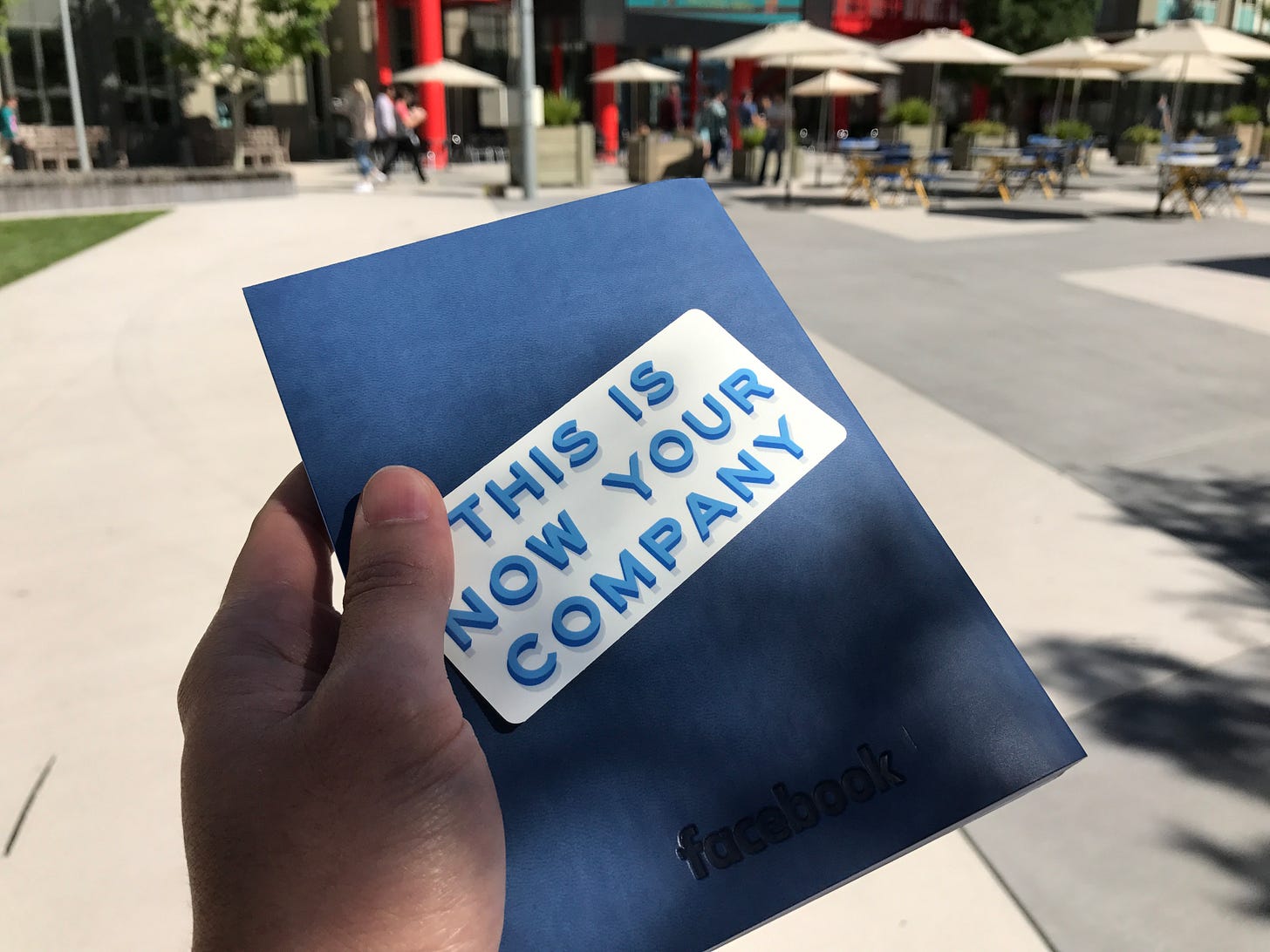This is now your company
How a sticker became my career compass.
After 3,032 days, I'm saying goodbye to Meta. Today is my last day.
I still remember my first one.
They handed me a laptop, a blue notebook embossed with “facebook,” and a sticker that said: This is now your company.
I did the math—some vanishingly small fraction of the company was now “mine.” Not much, really. But over time, I came to own something more enduring: the work, the mess, the weird surprises, and lessons stuck around long after the stock vested.
I didn't understand it then. But through Composer, Instagram, and PyTorch, I've come to appreciate just how true it was.
I started out as a full-stack engineer on Facebook Composer (the little box at the top of your feed where you post text, photos, videos, and more). At the time, over 30 product teams were building on top of it, but only two backend engineers were supporting the platform. I was one of the two.
To avoid getting buried in endless support requests, I learned to write detailed internal wikis—so I could protect my time and focus on the problems I was genuinely curious about. What amazed me was that, even this year, someone found one of those old wikis and gave it a thumbs-up. Eight years later, it’s still doing its job.
So what was I up to? I proactively asked to work on the Sprouts ranking system—the engine that determined the order of post buttons built by 30+ other teams.
I wasn’t trying to invent the next ranking algorithm. I just wanted to understand how data moved—from your phone to the backend—and how that data powered machine learning. That curiosity cracked open the door to machine learning systems at scale and quietly shaped the rest of my career.
As the Composer team grew, I joined a small team at Instagram as its founding engineer. We spun out from the Instagram Ads Delivery team to ensure the accuracy of Instagram metrics like impressions and link clicks. My background in data and logging gave me the confidence to jump into a domain where data quality mattered as much as the metric products themselves.
My manager gave me two onboarding options: one small-scope but urgent, the other large-scope but long-term.
I said, why not both?
That spirit led me through some long weekends and deeper into both problems. The urgent one—refactoring InstagramAdsLogger—ended up cutting global CPU usage by 0.6% and saved the company $12M/year during the COVID-19 capacity crunch. The long one—migrating over 40PB of organic metric data—set the foundation for a new team that I helped hire and grow. Eventually, I became the Uber TL for Instagram's Ads and Organic metrics and co-founded the Instagram Metrics Council to align 100+ metric products across engineering, product, data, legal, and GTM.
After several years working across Facebook and Instagram, I assumed a new role: building and leading a small Infra team within PyTorch.
The team was known for its homebrew inference engine, AITemplate. This time, my manager gave me just one onboarding option: kill AITemplate.
It wasn't just a technically challenging pivot, but an emotional one as well. AITemplate had been the core of the team's identity. The decision to switch to PyTorch 2.0 led to significant attrition and many unknowns ahead.
We could have folded. Instead, we rebuilt.
We successfully pivoted from AITemplate to AOTInductor and made it the default lowering solution in the company, with numerous model launches and hundreds of millions in annual infra cost savings.
As our scope expanded, we rebranded as GPU Techniques—a team with a broader mandate in the new AI era. We helped launch Llama 2, 3, and 4, contributing to industry-leading performance milestones and sharing key innovations to push the boundaries of what's possible.
At our most recent offsite, 16 of us gathered—a group of performance engineers with a high bar and high trust, brainstorming what's next.
Stepping away now means I won't be part of writing the next chapter. That weighs on me. But I'm proud of where the team is, and I'm confident in where they're going.
Looking back, I realize how much I learned from the people around me—brilliant engineers who taught me to think differently, leaders who gave me room to grow, teammates who pushed through impossible problems alongside me. Meta became the place where I discovered what I was capable of.
I'll never forget my son took his first steps the same day I joined Meta. Eight years later, he is now a passionate baseball player. He has grown a lot. And so have I.
Thank you, Meta.
Welcome to Liu's Log
This is where I’ll be writing stories from the edge of tech—behind-the-scenes looks at scaling systems, building teams, and navigating the weird, fast-moving world of AI.
Whether you’re an engineer, a tech lead, a manager, or someone figuring out your next move—I hope you’ll enjoy the ride.
If you’d like to follow along, please subscribe.


